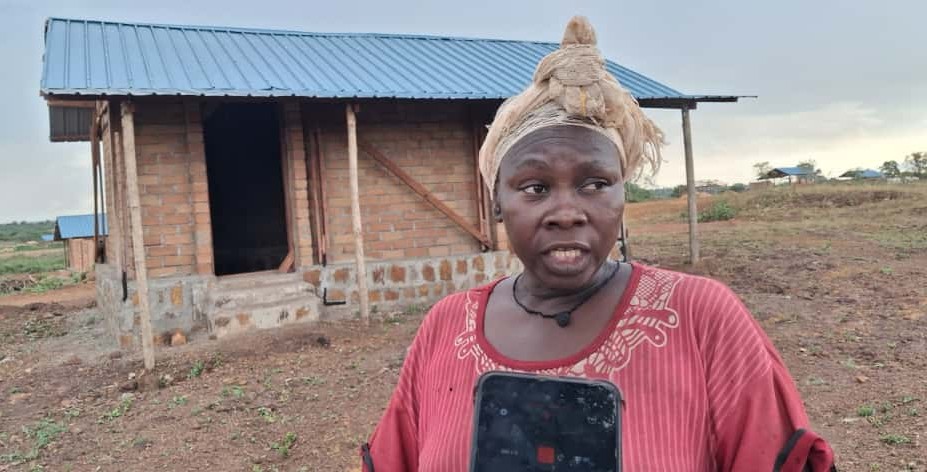
Under the warm afternoon sun of Wau, Christiana Ibrahim Ali stands before the doorway of her new home, a modest, concrete structure built by the International Organization for Migration (IOM).
Her face, weathered by years of hardship, now carries a quiet smile of triumph.
For the 38-year-old widow and mother of four, this small house in Khor Malang is more than just shelter; it’s the foundation of a new beginning, a symbol of resilience after years of loss and displacement.
“I can’t believe this miracle,” Christiana says, her voice trembling between relief and disbelief. “We lived under plastic sheets for years. Today, I have a real house, a toilet, and land in my name. I thank God and IOM for standing with us when we had nothing.”
Christiana’s story is one of many. Since the 2013 conflict tore through Wau, thousands of families, mostly women and children, were forced to flee their homes, seeking refuge in camps and Protection of Civilians (POC) sites.
For years, they lived in limbo, dependent on aid and haunted by memories of war. Now, a durable solutions project led by IOM and the Government of South Sudan, with support from the Government of Norway, is helping them rebuild — not just their homes, but their lives.
The Western Bahr el Ghazal Roadmap to Displacement Solutions Project, launched in 2023, is a $5 million initiative designed to support voluntary return, local integration, and safe relocation of internally displaced persons (IDPs).
It focuses on providing housing, land documentation, water, health, and livelihood support across Naivasha, Hai Masna, and surrounding host communities.
In Khor Malang, women are at the heart of this transformation. Many of them were once the invisible faces of displacement — widows, single mothers, and survivors of violence.
Today, they are emerging as the pillars of community rebuilding.
Flora Natale Federico, a 40-year-old mother of four, remembers the hopelessness of life in the POC site. But her voice brightens when she speaks of what the project has brought.
“We used to live with nothing,” she says, her hands busy sorting fabric in a small workshop supported by IOM. “Now we sew clothes — 500 to 700 pieces a day — and sell them to support our families. I can pay school fees and feed my children. It feels like we’ve been given back our dignity.”
For Flora and dozens of women like her, livelihood training has transformed dependency into opportunity.
Their tailoring cooperative now supplies uniforms and garments across Wau — proof that resilience can turn into enterprise when women are empowered.
According to Maj. Gen. Elia Kosta, Director General of Immigration and a member of the project’s steering committee, the initiative aligns with the National Strategy for Durable Solutions — a government-led framework for reintegration and recovery.
“This is not just a humanitarian response; it’s a pathway to long-term peace,” he explains. “Through partnerships with organizations like IOM, we are giving displaced people the means to rebuild their lives and contribute to the nation’s stability.”
Sarah Cleto Hassan Rial, former Governor of Western Bahr el Ghazal, echoed this sentiment, describing the initiative as a turning point for peace in the region.
“Security has improved significantly, and people are returning home,” she said. “The time for talking about solutions is over — now is the time to implement them.”
Inside her new two-room house, Christiana arranges a few simple belongings: a wooden bed, a cooking pot, and a family photo salvaged from years past.
Around her, children’s laughter fills the compound — a sound she once feared she might never hear again.
“I’m both mother and father to these children,” she says with a small smile. “We still face challenges — security, schools, hospitals — but having a home gives us strength to move forward.”
Despite lingering concerns about safety and infrastructure, Christiana remains hopeful. The families are expected to move permanently to Khor Malang by October 2025, once security measures are fully in place.
Daro Charles, Assistant Engineer at IOM, says construction is progressing steadily.
“This project is about restoring dignity,” he explains. “We’re not just building walls; we’re building futures.”
For the women of Khor Malang, this project is more than a return to normalcy — it’s a reclaiming of agency. Many who once depended on humanitarian aid are now learning trades, running small businesses, and organizing community savings groups.
“We are no longer just beneficiaries. We are builders of our own future,” Flora says proudly.
And for Christiana, standing at the doorstep of her new home, the message is clear — despite all that was lost, hope has survived.
“This house is not just mine,” she says, looking out toward the horizon. “It belongs to every woman who refused to give up — every mother who believed that one day, her children would sleep under a safe roof.


